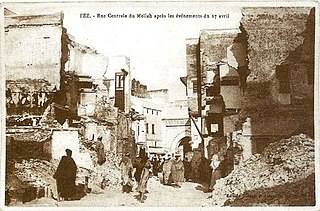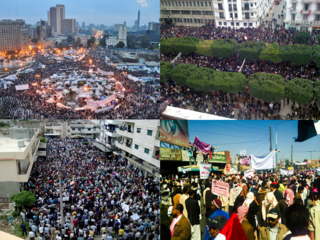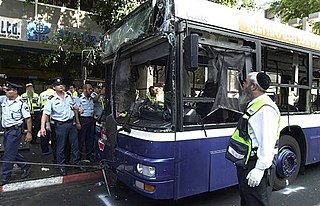 W
WThe Fes Riots, also known as the Fes Uprising or Mutiny, the Tritl and the Bloody Days of Fes were riots which started April 17, 1912 in Fes, the then-capital of Morocco, when French officers announced the measures of the Treaty of Fes, which created the French protectorate in Morocco.
 W
WThe 1990s uprising in Bahrain also known as the uprising of dignity was an uprising in Bahrain between 1994 and 1999 in which leftists, liberals and Islamists joined forces to demand democratic reforms. The uprising caused approximately forty deaths and ended after Hamad bin Isa Al Khalifa became the Emir of Bahrain in 1999 and a referendum on 14–15 February 2001 massively supported the National Action Charter. The uprising resulted in the deaths of around 40 civilians and at least one Bahraini soldier.
 W
WThe Gdeim Izik protest camp was a protest camp in Western Sahara, established on 9 October 2010 and lasting into November that year, with related incidents occurring in the aftermath of its dismantlement on 8 November. The primary focus of the protests was against "ongoing discrimination, poverty and human rights abuses against local citizens".
 W
WThe 2018–2021 Arab protests, known as Arab Spring 2.0, were massive anti-government protests in several Arab countries, including Morocco, Tunisia, Jordan, Sudan, Algeria, Egypt, Iraq, Lebanon, and Syria. Economic protests also took place in the Gaza Strip.
 W
WThe Arab Spring was a series of anti-government protests, uprisings, and armed rebellions that spread across much of the Arab world in the early 2010s. It began in response to oppressive regimes and a low standard of living, starting with protests in Tunisia. From Tunisia, the protests then spread to five other countries: Libya, Egypt, Yemen, Syria, and Bahrain, where either the ruler was deposed or major uprisings and social violence occurred including riots, civil wars, or insurgencies. Sustained street demonstrations took place in Morocco, Iraq, Algeria, Iranian Khuzestan, Lebanon, Jordan, Kuwait, Oman, and Sudan. Minor protests took place in Djibouti, Mauritania, Palestine, Saudi Arabia, and the Moroccan-occupied Western Sahara. A major slogan of the demonstrators in the Arab world is ash-shaʻb yurīd isqāṭ an-niẓām!.
 W
WThe First Intifada, or First Palestinian Intifada, was a sustained series of Palestinian protests and violent riots in the West Bank, Gaza Strip, and within Israel. The protests were against the Israeli occupation of the West Bank and Gaza that had begun twenty years prior, in 1967. The intifada lasted from December 1987 until the Madrid Conference in 1991, though some date its conclusion to 1993, with the signing of the Oslo Accords.
 W
WThe 2005 French riots, was a three-week period of riots in the suburbs of Paris and other French cities, in October and November 2005. These riots involved youth in violent attacks, and the burning of cars and public buildings.
 W
WThe 2019–2021 Lebanese protests, also known locally as the October Revolution, are a series of civil protests taking place in Lebanon. These national protests were triggered by planned taxes on gasoline, tobacco, and VoIP calls on applications such as WhatsApp, but quickly expanding into a country-wide condemnation of sectarian rule, stagnant economy, unemployment that reached 46% in 2018, endemic corruption in the public sector, legislation that was perceived to shield the ruling class from accountability and failures of the government to provide basic services such as electricity, water, and sanitation.
 W
WThe 2011–2013 protests in Sudan began in January 2011 as part of the Arab Spring regional protest movement. Unlike in other Arab countries, popular uprisings in Sudan had succeeded in toppling the government prior to the Arab Spring in 1964 and 1985. Demonstrations in Sudan however were less common throughout the summer of 2011, during which South Sudan seceded from Sudan, but resumed in force later that year and again in June 2012, shortly after the government passed its much criticized austerity plan.
 W
WThe Second Intifada, also known as the Al-Aqsa Intifada, was a Palestinian uprising against Israel. The general triggers for the violence were proposed as the failure of the 2000 Camp David Summit to reach final agreement on the Israeli-Palestinian peace process in July 2000. The violence started in September 2000, after Ariel Sharon made a highly provocative visit to the Temple Mount. The visit itself was peaceful, but, as anticipated, it sparked protests and riots which the Israeli police put down with rubber bullets and tear gas.
 W
WThe Tunisian Revolution, also called the Jasmine Revolution, was an intensive 28-day campaign of civil resistance. It included a series of street demonstrations which took place in Tunisia, and led to the ousting of longtime president Zine El Abidine Ben Ali in January 2011. It eventually led to a thorough democratisation of the country and to free and democratic elections.
 W
WThe Zemla Intifada is the name used to refer to disturbances of June 17, 1970, which culminated in a massacre by Spanish Legion forces in the Zemla district of El Aaiun, Spanish Sahara.